Keyword Research With AI: Unveiling the Future of SEO Success
Gone are the days of hunched hours spent brainstorming over a thesaurus, meticulously scribbling down keyword lists, and desperately searching for that elusive SEO goldmine. Enter the age of AI-powered keyword research, where intelligent algorithms illuminate hidden paths, unearth lucrative opportunities, and transform your approach to search engine optimization.
Imagine keyword research on steroids: a futuristic cocktail of data analysis, predictive insights, and laser-sharp targeting. No more guesswork, no more chasing fleeting trends. Just clear, actionable data that unlocks the secrets of user intent and propels your content to the top of search results.
Unleashing the Power of AI:
So, how does this magic work? AI-powered keyword research tools leverage a potent blend of technologies:
- Machine Learning: Algorithms scour vast databases of search queries, user behavior, and website content, identifying patterns and predicting future trends.
- Natural Language Processing (NLP): AI understands the nuances of human language, analyzing the semantic relationships between keywords and uncovering hidden topics and long-tail variations.
- Competitive Intelligence: Tools like Semrush and Ahrefs tap into competitor data, revealing their strongest keywords and offering opportunities to outrank them.
Benefits Beyond Imagination:
With AI as your trusty sidekick, keyword research becomes a strategic sprint, not a marathon. Here’s what you can expect:
- Uncover Hidden Gems: AI surfaces long-tail keywords with high potential and low competition, tapping into niche audiences and boosting organic traffic.
- Precise Targeting: Understand user intent with laser-sharp focus, crafting content that perfectly aligns with what people are searching for.
- Effortless Efficiency: Automate repetitive tasks like keyword analysis and competition research, freeing your time for strategic content creation and campaign optimization.
- Predictive Insights: Forecast future search trends and stay ahead of the curve, ensuring your content remains relevant and competitive.
What is keyword research?
Imagine you’re a detective, and your mission is to find out exactly what words or phrases people are typing into search engines. That is simply Keyword research.
It’s the fundamental step in SEO, where you identify popular words and phrases people enter into search engines related to your business or content.
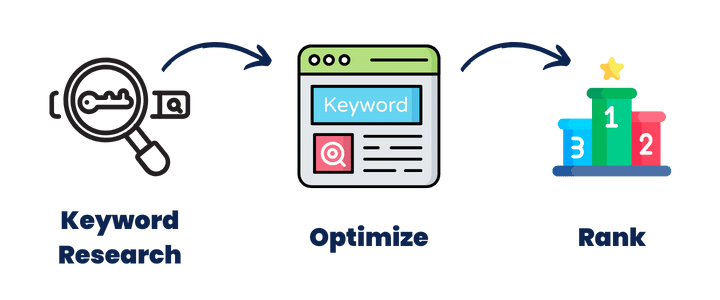
Why is this important?
By knowing these keywords, you can optimize your website and content to rank higher in the search engine, making it easier for those searching for your content to find you.
Without understanding what your potential visitors are searching for, you can’t effectively optimize your site or content.
The Keyword Bomber Method Allows Us to uncover and discover hundreds of potential hidden keywords and ideas that we can use to rank our website higher on Search Engines, especially Google in our case.
Google Auto Suggestions
Have you ever noticed how when you start typing something into Google, it begins to predict what you’re going to type next?
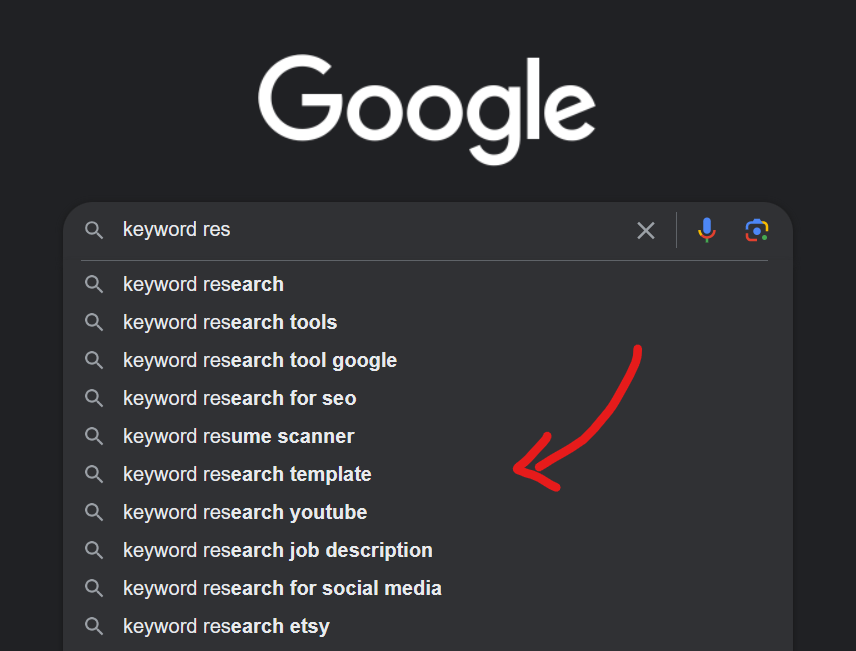
That’s Google Auto Suggestions at work! It’s like a crystal ball, revealing what other people have searched for when they typed the same initial words.
How is this related to keyword research?
Well, these suggestions are based on real searches by real people. This means they’re a goldmine of popular queries and phrases. Understanding these can give you a sneak peek into the minds of your potential visitors.
Automating with Python
Here’s where the magic begins. With the “Keyword Bomber” method, we’re not just passively looking at Google autosuggestions.
But, by harnessing the power of Python and AI, we automate the process of collecting these suggestions.
So, what we will do now is to connect Google Auto Suggestions with Python.
Let’s start first and understand the concept behind our project.
If you open your browser now and paste this URL:
http://google.com/complete/search?output=toolbar&gl=US&q=Digital MarketingYou will see that you will get a list of keyword suggestions in XML format, as shown below:
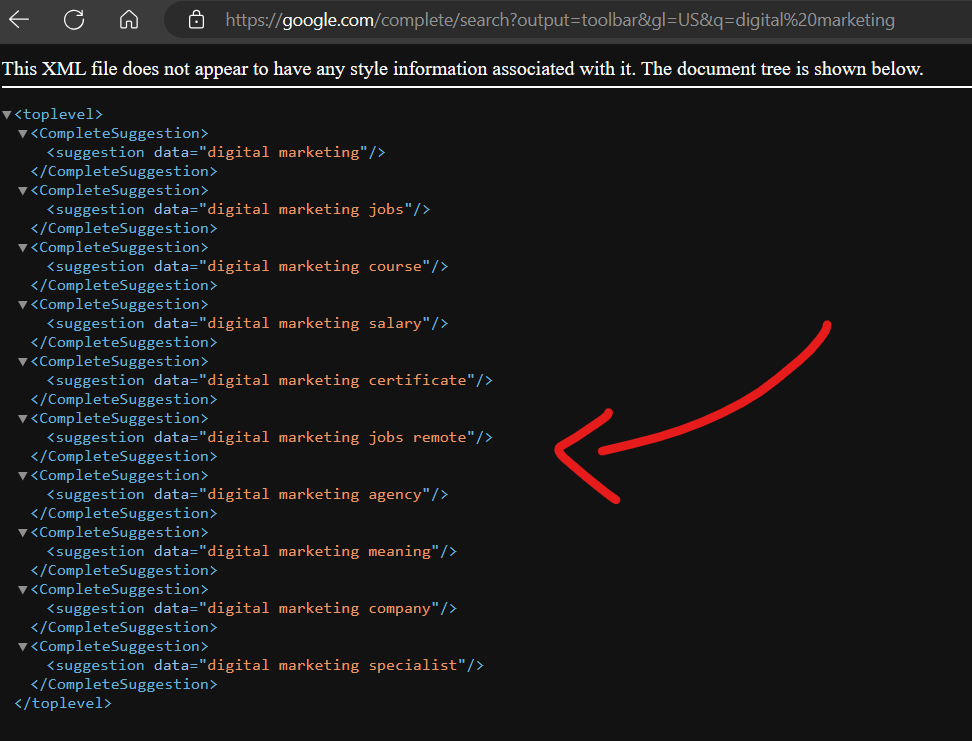
Now, here is the trick: instead of “digital marketing” we will pass “digital marketing a“
Like this:
http://google.com/complete/search?output=toolbar&gl=US&q=Digital Marketing aTake a look at the results:
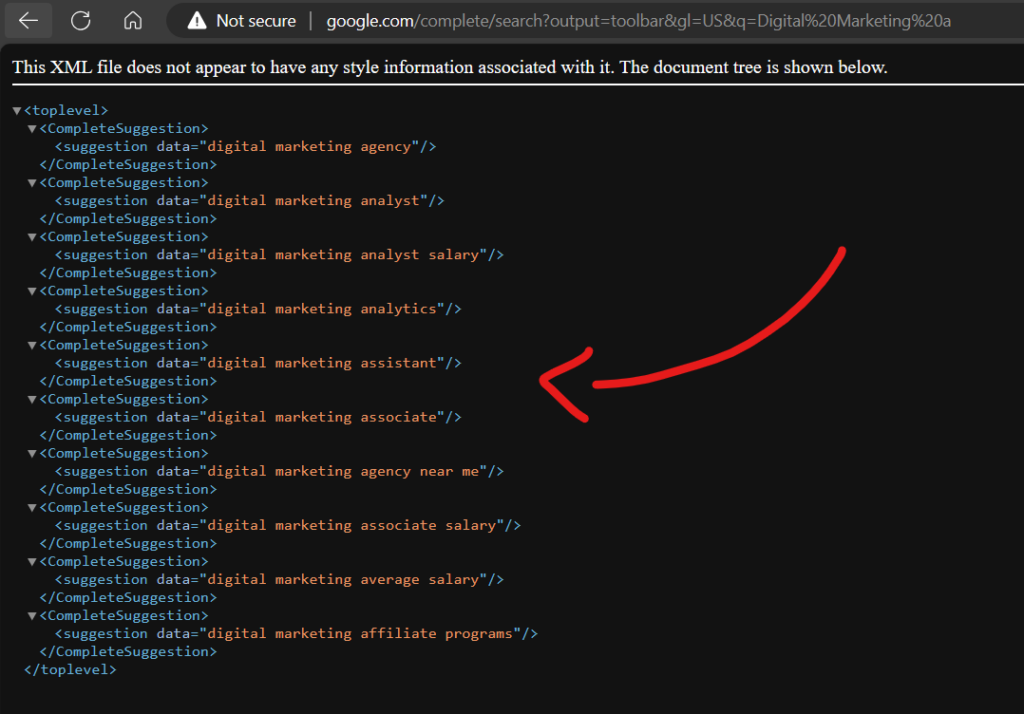
You see what happened now! We got alphabet suggestions for the keyword with the letter “a“.
We can do this with the whole alphabet!
Then we can try something else, like adding “vs” after the keyword, so we search for “digital marketing vs“
Then we can add Questions like “what digital marketing“
and so on.
Here is a set of categories I collected that you can use to join with the target keyword:
"Questions": ["who", "what", "where", "when", "why", "how", "are"]
"Prepositions": ["can", "with", "for"]
"Alphabit": list("abcdefghijklmnopqrstuvwxyz")
"Comparisons": ["vs", "versus", "or"]
"Intent-Based": ["buy", "review", "price", "best", "top", "how to", "why to"]
"Time-Related": ["when", "schedule", "deadline", "today", "now", "latest"]
"Audience-Specific": ["for beginners", "for students"]
"Problem-Solving": ["solution", "issue", "error", "troubleshoot", "fix"]
"Feature-Specific": ["with video", "with images", "analytics", "tools"]
"Opinions/Reviews": ["review", "opinion", "rating"]
"Cost-Related": ["price", "cost", "budget", "cheap", "expensive", "value"]
"Trend-Based": ["trends", "new", "upcoming"]There are many others, but I think this list is a very strong starting point for our project.
Ok, now we have the core idea of our project, let’s automate the process with Python.
Don’t worry. I will give you the full source code later, and you can run it with a click, but for now, follow this to understand how this project works. Maybe you can update and make it more powerful.
Below is a Python function that takes a country and a keyword and returns back a list of keywords:
async def get_suggestions_for_query_async(query,country):
async with httpx.AsyncClient() as client:
try:
response = await client.get(f"http://google.com/complete/search?output=toolbar&gl={country}&q={query}")
suggestions = []
if response.status_code == 200:
root = ET.fromstring(response.content)
for complete_suggestion in root.findall('CompleteSuggestion'):
suggestion_element = complete_suggestion.find('suggestion')
if suggestion_element is not None:
data = suggestion_element.get('data').lower()
suggestions.append(data)
except Exception as e:
#nothing
error = e
return suggestions
Now, you can simply loop through the categories I gave you before and start building a list of hundreds of keyword suggestions.
Powering Our Results with AI
After we collect a list of keyword ideas and suggestions, it is time to feed this data to AI and make it analyze and generate an SEO strategy based on the collected data.
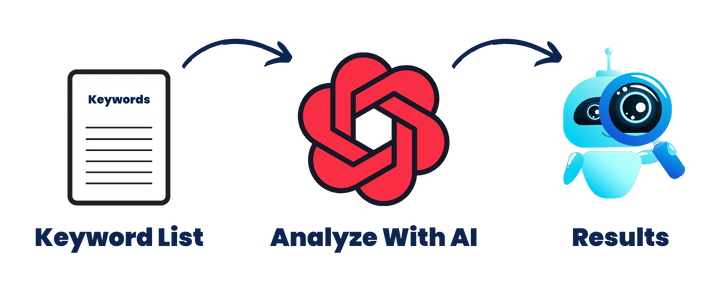
Instead of asking ChatGPT to “Generate an SEO strategy for a site about digital marketing” you will feed it a prompt like this one:
You are an expert in SEO and data-driven marketing strategies. You am familiar with analyzing keyword data, including metrics like search volume, paid competitors, SEO difficulty, and cost per click.
Using the provided [Keyword_data] categorized into various themes as follows:
Questions: Keywords starting with 'who', 'what', 'where', 'when', 'why', 'how', 'are'.
Prepositions: Keywords including 'can', 'with', 'for'.
Alphabet: Keywords beginning with each letter from A to Z.
Comparisons: Keywords containing 'vs', 'versus', 'or'.
Intent-Based: Keywords with 'buy', 'review', 'price', 'best', 'top', 'how to', 'why to'.
Time-Related: Keywords related to 'when', 'schedule', 'deadline', 'today', 'now', 'latest'.
Audience-Specific: Keywords like 'for beginners', 'for small businesses', 'for students', 'for professionals'.
Problem-Solving: Keywords around 'solution', 'issue', 'error', 'troubleshoot', 'fix'.
Feature-Specific: Keywords with 'with video', 'with images', 'analytics', 'tools', 'with example'.
Opinions/Reviews: Keywords including 'review', 'opinion', 'rating', 'feedback', 'testimonial'.
Cost-Related: Keywords about 'price', 'cost', 'budget', 'cheap', 'expensive', 'value'.
Trend-Based: Keywords like 'trends', 'new', 'upcoming'.
Please analyze these keyword suggestions and provide SEO strategy advice for each category. Focus on:
Content Strategy: Suggest types of content and approaches that could be effective for targeting keywords in each category.
Audience Engagement: Offer insights into how to engage different audience segments based on the keyword categories.
Competitor Analysis: Briefly discuss potential competitive landscapes for these keyword categories.
Long-Term SEO Planning: Provide ideas on incorporating these keywords into a broader SEO strategy, considering their categorical themes.
Provide a list of 7-10 bullet-point suggestions on how to use these keywords, highlighting unique opportunities and challenges they present.
[Keyword_data]: {KEYWORD_DATA}I know it is a bit long, and you can see at the end we are passing the keyword data to the prompt, but this is how you can get the best of AI and language models by crafting the right prompts.
And as we learned in Prompt Engineering, there is nothing called the best prompt. We always try to optimize, tune, test, and evaluate to get the best results.
Anyway, the idea here is to pass this prompt to AI using OpenAI API in the same Python script. In this, we build an automation workflow. Where you just pass a keyword, and the script will find keywords, connect with openAI, generate the analysis and get you the final results.
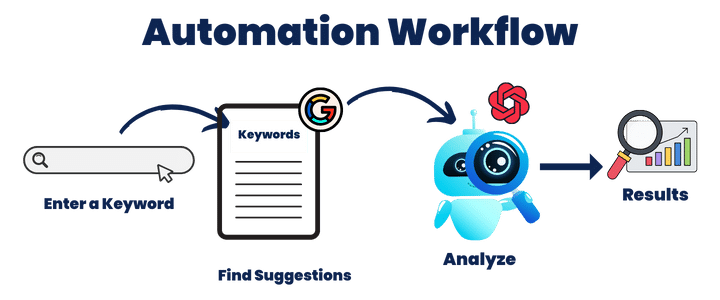
This is the power of automation workflows. This is exactly what I teach in My Prompt engineering course. You will learn how to build any workflow to automate almost anything with the power of AI, Python, and Power Prompts.
Going back to our script here is simply the function I used to connect my data and the prompt with AI:
async def suggestions_ai_analysis(keyword_data: str, api_key):
max_retries = 5
for _ in range(max_retries):
try:
# Get Json Structure
prompt = prompts.suggestion_keywords_analysis.format(
KEYWORD_DATA=keyword_data
)
return await llm.generate_response(prompt, LLM_MODEL, api_key)
except Exception as e:
print(
f"Failed to generate analysis for suggestion keywords. Exception type: {type(e).__name__}, Message: {str(e)}"
)
return ""
You see, this function has keyword_data as a parameter. This data will be chained in the prompt in this line:
prompt = prompts.suggestion_keywords_analysis.format(
KEYWORD_DATA=keyword_data
)
Then, the prompt will be passed to OpenAI with a function I created, “generate_response” and get the results back.
Run The Project
What are the steps to get your project up and running.
1. Download the project
download the entire “Keyword Bomber” project.
2. Open with Your Favorite IDE
Once downloaded, extract the files and open the project with Visual Studio Code or any IDE you prefer.
3. Install the Requirements
Run the following commands in the terminal:
pip install streamlit asyncio pandas httpx requests openai
We still have one requirement, which is adding your OpenAI API Key in the app.py script here:
#Set your Open AI API Key
API_KEY = "sk-XXX"4. Running the Project in Terminal
Now, it’s time to bring your project to life. In the terminal, navigate to your project directory and run the following command:
python app.pyRunning the UI
But what if you want a more visual, interactive experience?
That’s where Streamlit comes in. I’ve crafted a user-friendly UI for the “Keyword Bomber” tool. To test it, run this command in your terminal:
streamlit run ui.pyAnd the UI will open in your Browser:
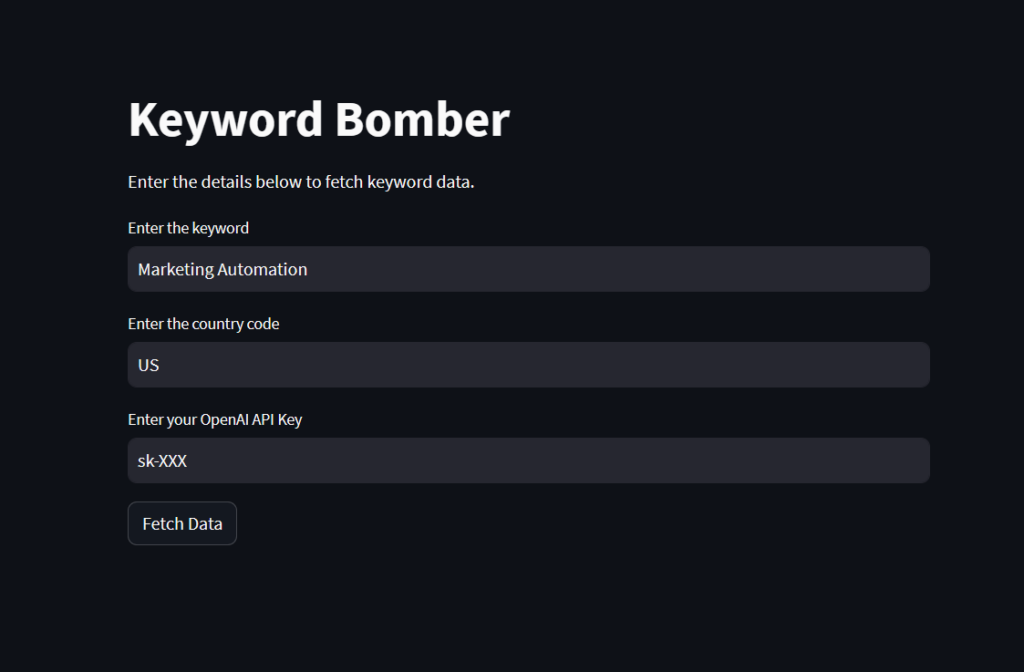
Turn This Project Into 3 Income Streams!
We’ve built something amazing today – a powerful tool that automates and revolutionizes SEO research using Python and AI.
But why stop at just using it for your own SEO? It’s time to think bigger. Here’s how you can turn this project into not one, not two, but three streams of income!
1. Freelancing
There’s a massive demand for SEO and digital marketing services. Companies and individuals alike are constantly seeking ways to improve their online presence. And what you have is not just a service but an AI-powered full solution.
- Offer Customized SEO Services: Use your “Keyword Bomber” to offer keyword research, SEO strategy, and content planning services. Your ability to provide detailed, AI-driven insights will set you apart from the competition.
- Create Scripts: Some clients might want their own customized version of a keyword research tool. Use your skills to create and sell scripts or even offer to set up and maintain the tool for them for an ongoing fee.
2. API Development
This project and similar ones have the potential to be API.
By turning it into an API and selling access on platforms like RapidAPI, as I do, you’re offering a valuable resource to developers and businesses.
- Develop an API: Package your “Keyword Bomber” script’s functionality into an API. Ensure it’s well-documented, reliable, and scalable.
- Monetize on API Marketplaces: Platforms like RapidAPI are where developers and companies look for APIs to enhance their applications. List your API there and set a pricing model that could include pay-per-use or subscription plans.
3. Online Tool
Finally, create an online tool with this script.
By integrating it with a user-friendly interface on a WordPress website, as I did with my Keyword Bomber tool, you can attract a wide range of users, from SEO professionals to bloggers and small business owners.
- Create a Subscription-Based or Points System Website: Develop a WordPress site where users can access your tool by subscribing or by buying points.
- Monetize Through Ads and Affiliates: Even if you offer the tool for free, you can monetize your site through ad spaces, affiliate marketing, or by offering premium services.
